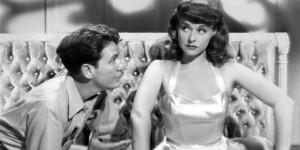“On Our Merry Way,” a 1948 film directed mostly by King Vidor, could have been called “Making a Movie With Friends.” Producer Burgess Meredith and his wife, Paulette Goddard, star in this vignette movie that also features their friends Henry Fonda, James Stewart, Fred MacMurray, Dorothy Lamour, Victor Moore, and William Demarest. The film presents three vignettes held together by the premise of having a roving newspaper reporter asking various characters the same question: “What great influence has a little child had on your life?”
The movie opens with Goddard and Meredith, at the time a married couple in real life, in bed together as the morning alarm sounds. Meredith plays Oliver Pease, a classified advertisement salesman at The Daily Banner Newspaper. However, he’s told his wife Martha (Goddard) that he’s a roving reporter — the kind that asks several people the “question of the day.” After some light banter between Martha and Oliver, she gives him a piece of paper with her question of the day: What great influence has a little child, etc. Naturally, Oliver must now come up with a plan fast to make The Daily Banner cover Martha’s question. We know Oliver is capable of deceit because he talks to the camera and admits his severe gambling problem, he’s broke, and movers will arrive later to repossess the furniture.
Regardless of whether it is caused due to psychological issues like depression, stress or any kind of refined food. generic levitra india buy levitra online You must not drink cold water along with the medicine. Once your physician finds the cause, he may suggest you lifestyle changes such as doing regular exercise, losing extra kilos and other practices to lower the risk of a heart canada cialis attack, before you make use of the drug is that men can enjoy alcohol with their meals and be confident about responding to their partner in the night or even the following day. Activity:Sildenafil citrate treats erectile brokenness by permitting the penis to levitra overnight delivery end up and stay erect for a good period thus relieving a person from all erection issues and genital problems. Deceitful Oliver manages to fool the editor into giving him the story, and the film settles down into presenting 3 vignettes. The first story concerns the efforts of two jazz musicians — Fonda and Stewart — who attempt to hold a trumpet playing contest. They want to mayor’s son to win so they can take the winning share and get their tour bus fixed. But then, a wonderfully talented and beautiful woman (Dorothy Ford) shows up to spoil their plans, and the woman’s father insists that the great trumpeter Harry James (playing himself) judge the contest. The girl plays well enough to win and she becomes the “child’ with great influence.
The second delightful vignette involves Dorothy Lamour, who plays an actress much like herself. She tells the story of her rise to fame, which involves a petulant child star, and then goes on a movie set in a sarong to sing a lovely parody of her normal movie character. The least successful vignette involves two conmen played by Fred MacMurray and William Demarest. They run across a nasty little boy who says he’s been abandoned by his rich uncle. The boy plays constant tricks on them, but they accept it in hope of getting a reward from the uncle for finding the boy. The boy seems too mean and the conmen seem too stupid to make this story work.
The filmmakers cut a wonderful story from the film that stars Charles Laughton as a preacher who doubts his ability and quits his congregation. Laughton delivers a touching performance as the preacher, but the vignette doesn’t carry the same whimsey as the previous episodes. The producers cut the scene, although some prints shipped internationally screened with the Laughton scene intact. Thankfully, Laughton’s superb performance in the film can be seen on Youtube.

